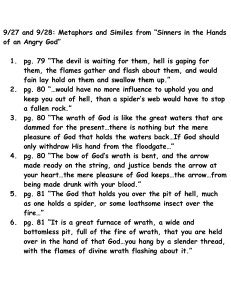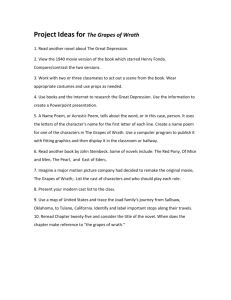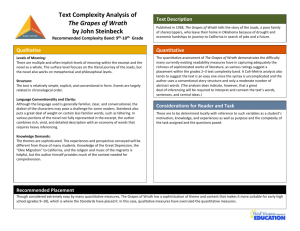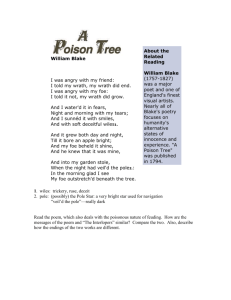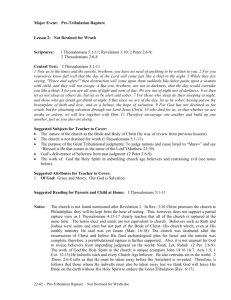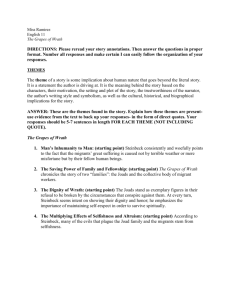1Thes5_9 - Amador Bible Studies
advertisement
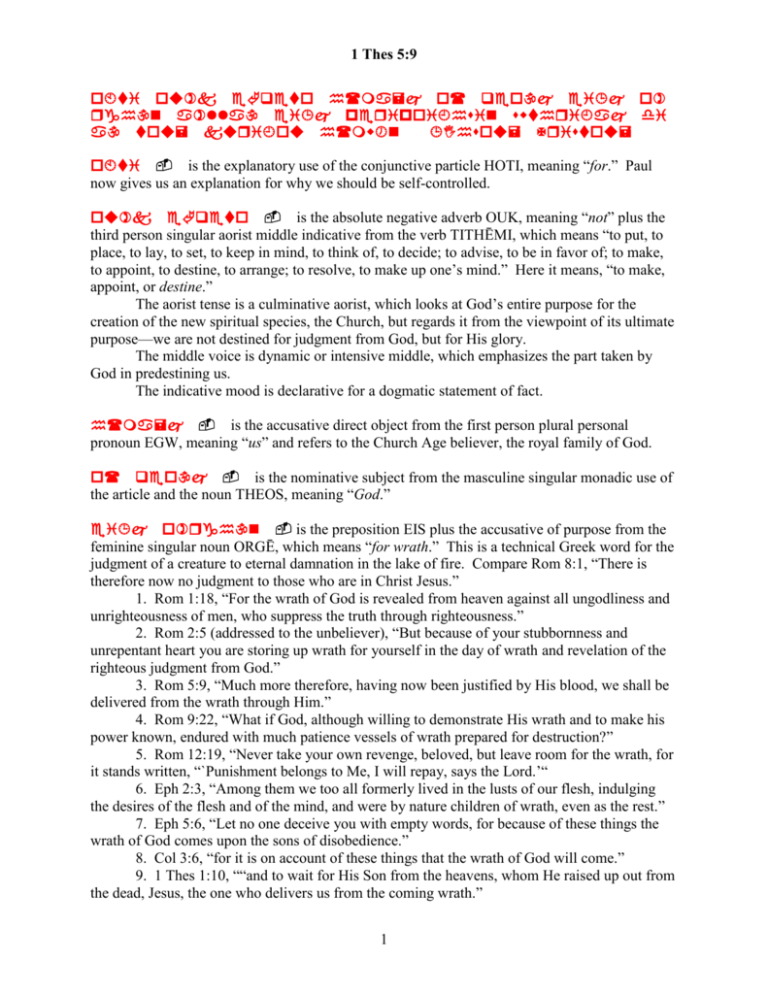
1 Thes 5:9 is the explanatory use of the conjunctive particle HOTI, meaning “for.” Paul now gives us an explanation for why we should be self-controlled. is the absolute negative adverb OUK, meaning “not” plus the third person singular aorist middle indicative from the verb TITHĒMI, which means “to put, to place, to lay, to set, to keep in mind, to think of, to decide; to advise, to be in favor of; to make, to appoint, to destine, to arrange; to resolve, to make up one’s mind.” Here it means, “to make, appoint, or destine.” The aorist tense is a culminative aorist, which looks at God’s entire purpose for the creation of the new spiritual species, the Church, but regards it from the viewpoint of its ultimate purpose—we are not destined for judgment from God, but for His glory. The middle voice is dynamic or intensive middle, which emphasizes the part taken by God in predestining us. The indicative mood is declarative for a dogmatic statement of fact. is the accusative direct object from the first person plural personal pronoun EGW, meaning “us” and refers to the Church Age believer, the royal family of God. is the nominative subject from the masculine singular monadic use of the article and the noun THEOS, meaning “God.” is the preposition EIS plus the accusative of purpose from the feminine singular noun ORGĒ, which means “for wrath.” This is a technical Greek word for the judgment of a creature to eternal damnation in the lake of fire. Compare Rom 8:1, “There is therefore now no judgment to those who are in Christ Jesus.” 1. Rom 1:18, “For the wrath of God is revealed from heaven against all ungodliness and unrighteousness of men, who suppress the truth through righteousness.” 2. Rom 2:5 (addressed to the unbeliever), “But because of your stubbornness and unrepentant heart you are storing up wrath for yourself in the day of wrath and revelation of the righteous judgment from God.” 3. Rom 5:9, “Much more therefore, having now been justified by His blood, we shall be delivered from the wrath through Him.” 4. Rom 9:22, “What if God, although willing to demonstrate His wrath and to make his power known, endured with much patience vessels of wrath prepared for destruction?” 5. Rom 12:19, “Never take your own revenge, beloved, but leave room for the wrath, for it stands written, “`Punishment belongs to Me, I will repay, says the Lord.’“ 6. Eph 2:3, “Among them we too all formerly lived in the lusts of our flesh, indulging the desires of the flesh and of the mind, and were by nature children of wrath, even as the rest.” 7. Eph 5:6, “Let no one deceive you with empty words, for because of these things the wrath of God comes upon the sons of disobedience.” 8. Col 3:6, “for it is on account of these things that the wrath of God will come.” 9. 1 Thes 1:10, ““and to wait for His Son from the heavens, whom He raised up out from the dead, Jesus, the one who delivers us from the coming wrath.” 1 1 Thes 5:9 10. 1 Thes 2:16, “who tried to hinder us from speaking to the Gentiles in order that they might be saved, resulting in always filling up their sins. But the wrath will come upon them through all eternity.” “for God has not destined us for wrath” is the strong adversative conjunction ALLA, meaning “but.” is the preposition EIS plus the accusative of purpose from the feminine singular noun PERIPOIĒSIS, which means “obtaining, gaining; possession, property; keeping safe, saving, preserving.” Here it means “for obtaining.” is the objective genitive from the feminine singular noun SWTĒRIA, which means “salvation, deliverance. This is a reference to our eternal salvation at the moment of faith in Christ. is the preposition DIA plus the ablative of agency from the masculine singular article and the nouns KURIOS, IĒSOUS and CHRISTOS, plus the possessive genitive singular from the personal pronoun EGW, meaning “through our Lord Jesus Christ.” “but for obtaining salvation through our Lord Jesus Christ.” 1 Thes 5:9 corrected translation “for God has not destined us for wrath, but for obtaining salvation through our Lord Jesus Christ.” Explanation: 1. The entire sentence says, “But since we are of the day, let us be self-controlled, having put on the breastplate of doctrine and virtue love, and the helmet, the confidence of salvation; for God has not destined us for wrath, but for obtaining salvation through our Lord Jesus Christ.” 2. We have eternal salvation positionally at the moment of faith in Christ during our lifetime here on earth. But we will not fully experience eternal salvation until we receive our resurrection body at the Rapture of the Church. 3. God has given us forty things related to salvation now. But the full use and appreciation of these things will not occur until we have died, received our resurrection bodies, and completed the judgment seat of Christ. 4. God has destined us to live with Him forever, in perfect righteousness and blessing with the capacity to appreciate and enjoy all that awaits us in heaven. On the other hand, the unbeliever has nothing to look forward to except eternal pain and suffering with no escape. 2 1 Thes 5:9 5. Since all this is true, we should have a spiritual life now that reflects that wonderful status in eternity. Therefore, we should have enough self-discipline and self-control now to use the two power options, the three spiritual skills, the problem solving devices and execute the protocol plan of God. For these are the things that will give us even greater capacity for and attainment of eternal blessings and rewards. 6. Another way of saying this is: live your life in the light of eternity. a. Don’t wait until eternity to allow God the Holy Spirit to control your soul; do it now. b. Don’t wait until eternity to learn doctrine; do it now. c. Don’t wait until eternity to use the problem solving devices; it’s too late to use them then. d. Don’t wait until eternity to execute God’s plan for your life; it’s too late then. 7. You are a Church Age believer. Therefore, you are a heavenly person. Your life is in heaven. Your home is in heaven. Everything about you is related to eternity. You are only here for a blink of the eye. Start living like you are already in heaven. Make use of your heavenly assets now. There’s no need to wait. 8. Your destiny is to be with God forever; therefore, why not spend a little time with Him now so you can get use to the relationship. You can only do this through the use of your own free will to get in fellowship, stay in fellowship, and learn as much as you can about who and what God is all about. 9. At the moment of faith in Christ you obtained perfect, eternal salvation. God has already done the most for you that He can ever do. Now He can only do much more than the most. How is that possible? All things are possible with God through grace. 3
